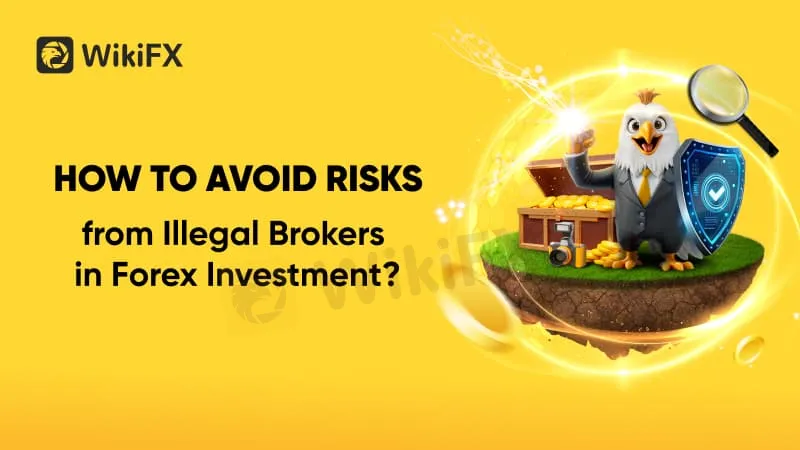简体中文
繁體中文
English
Pусский
日本語
ภาษาไทย
Tiếng Việt
Bahasa Indonesia
Español
हिन्दी
Filippiiniläinen
Français
Deutsch
Português
Türkçe
한국어
العربية
How to Avoid Risks from Scam Brokers in Forex Investment?
Abstract:In recent years, the forex market has become a popular choice for global investors due to its high liquidity and 24-hour trading advantages. However, according to the recently concluded WikiFX "3·15 Forex Rights Protection Day " event, we received over 6,000 pieces of evidence exposing rights violations within a short period. This reflects that, although the forex industry is becoming more regulated, fraudulent platforms continue to emerge, causing significant suffering for many victims.

Introduction: Opportunities and Pitfalls in the Forex Market
In recent years, the forex market has become a popular choice for global investors due to its high liquidity and 24-hour trading advantages. However, according to the recently concluded WikiFX “3·15 Forex Rights Protection Day ” event, we received over 6,000 pieces of evidence exposing rights violations within a short period. This reflects that, although the forex industry is becoming more regulated, fraudulent platforms continue to emerge, causing significant suffering for many victims.
These illegal brokers often lure investors with promises of “high returns” and “zero risk,” and some even impersonate well-known brokers. In reality, they profit through false advertising, money schemes, or outright theft of funds. In such a complex market environment, learning to verify a broker's regulatory licenses has become the first line of defense for forex investors to avoid risks.
Broker Regulatory Licenses: Legitimacy is the Lifeline
Each country has its own authoritative regulatory bodies, such as the NFA (USA), ASIC (Australia), and FCA (UK). Brokers operating in these jurisdictions are subject to strict oversight by local regulators. However, investors should be cautious:
- Beware of “Regulatory” Traps: Some platforms claim to hold licenses from certain countries or regions, but these jurisdictions may have lax regulations or be small islands with minimal oversight. While they may issue licenses, the associated risks remain high.
- Verify the Authenticity of Regulatory Numbers: Some illegal platforms provide fake regulatory licenses. Investors must verify the legitimacy of these licenses by checking the broker's name or license number on the official regulatory website.
Before depositing funds, investors must conduct the following checks on a broker:
- Regulatory Bodies: Is the broker regulated by top-tier authorities like NFA, ASIC, or FCA?
- License Scope: Does the license cover all types of services offered by the broker?
- Historical Record: Has the broker been penalized for violations or involved in fund misappropriation cases?
- Fund Segregation: Are client funds held in segregated accounts with third-party banks, and can this be verified?
- Localized Services: Does the broker provide compliant localized services and support?
How Can Investors Quickly Identify Regulatory Risks?
For many forex investors, identifying regulatory traps and verifying license authenticity can be challenging. Due to a lack of in-depth industry knowledge, these risks are often overlooked. How can investors simplify and safely verify the authenticity of regulatory bodies?
By leveraging WikiFX's global expertise and over a decade of industry experience, the WikiFX Rating System's regulatory index can quickly help investors identify regulatory risks.
The regulatory index is a quantitative assessment of a broker's regulatory status, developed by WikiFX's professional team using regulation grading standards, actual regulation values, regulation effectiveness models, and regulation anomaly prediction models. Through rigorous and scientific algorithms, it helps investors minimize trading risks to the greatest extent possible.
Rational Investing Starts with Respecting the Rules
The forex market offers no shortcuts to “overnight wealth” but is riddled with traps that prey on the uninformed. By rigorously verifying broker qualifications and effectively utilizing WikiFX, investors can keep risks within manageable limits. Please remember that safety is the foundation of trading.
Choose Brokers with WikiFX for Safer Forex Investment!

Disclaimer:
The views in this article only represent the author's personal views, and do not constitute investment advice on this platform. This platform does not guarantee the accuracy, completeness and timeliness of the information in the article, and will not be liable for any loss caused by the use of or reliance on the information in the article.
Read more

Reviewing CFreserve - Regulation Status, Operation Period & More
Has CFreserve deceived you financially? Did you face problems regarding forex investment withdrawals with this broker? You’re not alone! Read this exposure story to know how it's duping investors.

Fake FX Investment Scheme Cost Malaysians RM3.9 Million
38 Malaysian investors have come forward alleging they were deceived by a fraudulent foreign exchange (forex) investment scheme, resulting in collective losses exceeding RM3.9 million.

Promised RM2 Million, But Lost Nearly RM800K
A 47-year-old Malaysian woman has suffered a devastating financial loss of RM794,000 after falling victim to a fraudulent online investment scheme that promised to double her returns.

33 Transfers Later, His Savings Were Gone Entirely
A Malaysian man lost more than RM326,000 to an online investment scam. He was misled by false ads that claimed he could earn returns of up to 200% in just one week.
WikiFX Broker
Latest News
Overlooking Broker Spreads? It’s Costing You More Than You Think
After Zuckerberg spent billions on an AI dream team,' he has to deliver for Meta shareholders
Gold Prices Fall Instead of Rising, Hitting a Two-Week Low
Nigeria to Launch Sweeping Cybersecurity Reforms Amid Rising Digital Threats
Encountered a problematic response from an AI model? More standards and tests are needed, say researchers
Top Wall Street analysts like these three stocks for long-term growth
Dow futures slide 150 points as oil rises following U.S. bombing of Iran: Live updates
Asia-Pacific markets set to open lower as U.S. bombing of Iran escalates Middle East crisis
Oil prices jump 3% after U.S. strikes on Iran raise fears of supply disruption
Why electricity prices are surging for U.S. households
Currency Calculator


